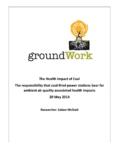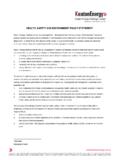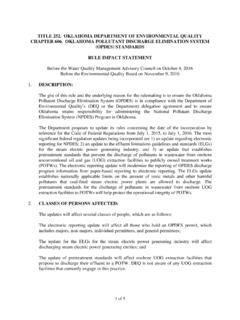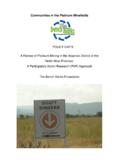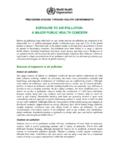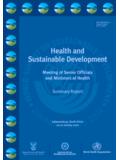Transcription of BRIEFING ITY Y Air Pollution and Health in Turkey
1 BRIEFING Turkish Medical Association Turkish Society of Public Health Specialists Turkish Thoracic Society Turkish Respiratory Society Turkish Occupational Medicine Society 1 DATE HERE AIR QUALITY DATE HERE AIR QUALITY PUBLISHED February 2015 with endorsements from the following Turkish medical associations: The following Turkish medical associations endorse this factsheet Turkish Medical Association (T rk Tabipleri Birli i TTB) Turkish Society of Public Health Specialists (Halk Sa l Uzmanlar Derne i HASUDER) Turkish Thoracic Society (T rk Toraks Derne i TTD) Turkish Respiratory Society (T rkiye Solunum Ara t rmalar Derne i T SAD) Turkish Occupational Medicine Society ( ve Meslek Hastal klar Uzmanlar Derne i - MUD) Air Pollution and Health in Turkey Facts, Figures and Recommendations Air Pollution is an important risk factor for Health in Europe and worldwide.
2 A recent review of the global burden of disease showed that it is one of the top ten risk factors for Health globally1. Worldwide an estimated 7 million people died prematurely because of Pollution ; in the European Union (EU) 400,000 people suffer a premature death2. The Organisation for Economic Cooperation and Development (OECD) predicts that in 2050 outdoor air Pollution will be the top cause of environmentally related deaths worldwide3. In addition, air Pollution has also been classified as the leading environmental cause of cancer4. WHY IS AIR Pollution A CONCERN FOR Health ? Exposure to outdoor air Pollution is associated with a broad spectrum of acute and chronic Health effects ranging from irritant effects to death6. While the impacts on respiratory and cardiovascular disease are well documented, new science also shows air Pollution as an emerging risk factor for children s Health and even diabetes7.
3 Sensitive and vulnerable groups such as pregnant women, children, the elderly and those already suffering from respiratory and other serious illnesses or from low income groups are particularly affected. The Health effects of air Pollution are well documented, even though the Pollution mixtures in the air can be complex. Air Pollution exists as a mixture of liquid and solid phases; a mixture of gaseous, volatile, semi-volatile and particulate matter, and its exact composition varies widely. The main pollutants for which numerous studies on Health effects exist are particulate matter, ozone, nitrogen dioxide, sulphur dioxide, methane, mercury and black carbon. Impacts of air Pollution in Turkey It is still difficult to gather adequate and verified data on air Pollution in Turkey . From the evidence available, Turkey emerges as a country with one of the highest rates of premature deaths due to air Pollution in Europe.
4 According to recent estimates5, in 2010, 28,924 people in Turkey died prematurely from ambient PM and ozone exposure. 2 AIR Pollution IN Turkey Air quality in Turkey is a big concern: measurements show that citizens all over the country breathe in air that is considered harmful to Health . The air quality standard for and concentrations of PM10 are much higher than what the EU and the World Health Organization (WHO) have set to protect Health . According to the European Environment Agency (EEA), percent of the urban population in Turkey is exposed to unhealthy levels of particulate matter (PM10)7. Ankara has PM yearly average concentrations of 58 ug/m3, and Istanbul 48ug/m3. According to the Turkish Ministry of Environment and Urbanization, the cities with the most polluted air are I d r, Batman and Afyon 8. IMPACTS OF AIR POLLUTANTS ON Health RESPIRATORY SYSTEM Effects include: increased respiratory symptoms, infections; increased airway reactivity, irritation; lung inflammation; increased respiratory mortality and hospital visits, hospitalisation; decreased lung function, asthma exacerbations, exacerbation of chronic obstructive pulmonary disease (COPD), and increased lung cancer risk.
5 The US American Thoracic Society identified a broad range of respiratory Health effects associated with air Pollution that should be considered adverse , spanning outcomes from death from respiratory diseases to reduced quality of life, and including some irreversible changes in physiologic function9. Studies show that lung function growth in children is reduced in areas with high PM concentrations1o; and this function either improves when children are relocated to areas with lower air Pollution , or deteriorates when children move to areas with greater air pollution11. This effect on lung development is an additional risk factor for developing lung diseases later in life. Air Pollution exposure can trigger new cases of asthma, worsen a previously-existing respiratory illness, and provoke development or progression of chronic illnesses including COPD, emphysema and lung cancer.
6 COPD is a life-threatening lung disease that interferes with normal breathing. The number of deaths from COPD has increased more than 60% over the last 20 years, and air Pollution is an important risk factor through inflammation, an immunological response. The inflammatory response is referred to as chronic bronchitis. In the air cells it leads to destruction of tissue, or emphysema. CARDIOVASCULAR SYSTEM Effects include: altered cardiac autonomic function, myocardial infarction, angina pectoris, increased blood pressure, arteriosclerosis, hypertension, and increased cerebrovascular ischemia. In recent years, a large body of scientific evidence has emerged that has strengthened the link between exposure to different air pollutants and cardiovascular effects, for acute and/or chronic effects12. The biological mechanisms linking air Pollution to heart disease involve direct effects of pollutants on the cardiovascular system, blood, and lung receptors, but also indirect effects mediated through pulmonary oxidative stress and inflammatory responses.
7 Direct effects may occur via agents that readily cross the pulmonary epithelium into the circulation, such as gases, and possibly ultrafine particulate matter along with soluble constituents of ( transition metals). These direct effects of air Pollution represent a plausible explanation for the occurrence of rapid cardiovascular responses (within a few hours), such as increased myocardial infarctions. Less acute and chronic indirect effects (from several hours to days) may occur via pulmonary oxidative stress/inflammation induced by inhaled pollutants. Peaks in the concentration of other air pollutants especially the combination of fine particulate matter and nitrogen oxides correlate with increased hospital admissions for potentially fatal disturbances of heart rhythm. Most often those hospital admissions are due to ischemic heart diseases; and congestive heart failure.
8 3 NERVOUS AND CEREBROVASCULAR SYSTEM Effects include: neurodevelopmental disorders, neuro-inflammation, oxidative stress, alterations in the blood-brain barrier, headaches, anxiety, strokes, Alzheimer s disease, and Parkinson s disease. The mixture of components of air Pollution also includes heavy metals that are emitted into the atmosphere, for example mercury or lead. They remain in the air until they are transmitted back to the earth by rain. Many of heavy metals are particularly neurotoxic to the human body, especially to children. Lead exposure in childhood can result in decreased cognitive functioning, including assessments of reaction time, scanning and executive functioning in adults, that is, cognitive flexibility and abstract reasoning. Lead exposure can also affect subsequent verbal memory and verbal fluency.
9 Aggression, behavioural issues (such as depression and sleep complaints) and increased anti-social and delinquent behaviour have also been positively correlated with lead exposure. Mercury is a potent neurotoxin that can severely harm the brain and the developing nervous system. Exposure to methyl mercury in the womb can adversely affect the developing brain and nervous system of a baby, resulting in eventual impacts on cognitive thinking, memory, attention, language, and fine motor and visual spatial skills. REPRODUCTIVE CAPACITIES AND CHILDREN S Health Effects include: compromised sperm quality, DNA fragmentation, low birth weight, preterm birth, and small gestational age births. In developing embryos, the placenta serves as a barrier against many environmentally hazardous substances, but it might not be protective against all components of air Pollution .
10 Children, even before birth, are particularly susceptible to air pollutants. Increasing evidence shows how early-life exposure to air pollutants is contributing to higher risks of developing chronic diseases later in life, including obesity, diabetes, and hormone related cancers such as breast and prostate cancer. Furthermore, recent studies found associations between exposure to outdoor air Pollution during pregnancy and lower birth weight, as well as higher rates of preterm birth and pre-eclampsia. It has been shown that there is an association between exposure to and birth outcomes, including low birth weight, preterm birth and small for gestational age births. WHY IS THE ENERGY SECTOR RELEVANT FOR AIR Pollution IN Turkey ? In every country, the energy sector is an important source of air Pollution . An analysis of the EEA shows that energy use and supply is responsible for 48% of NOx emissions, 35% of non-methane VOCs and 99% of sulphur dioxide (SO2) emissions7.
